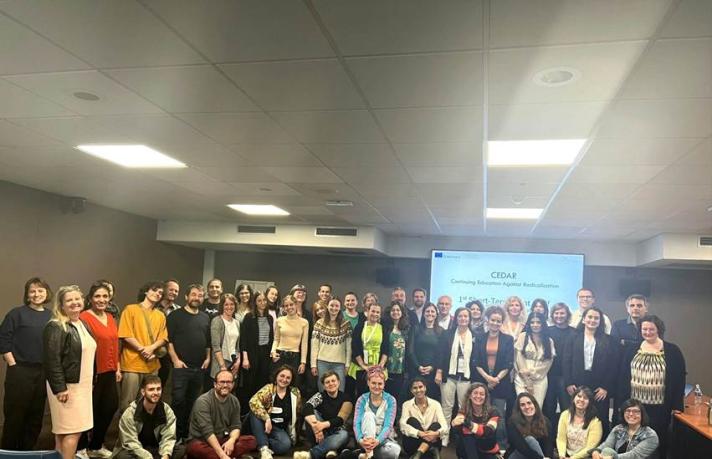In the current European P/CVE landscape, characterised by growing polarisation and conflict, young people can become especially vulnerable to radical and extremist propaganda. As such, higher education settings have become grounds for recruitment and the incitement of violence. However, and importantly, higher education institutions, alongside other youth-based community and judicial organisations, play a vital role in improving the critical thinking and personal development of young people, and therefore have an important role to play in preventing radicalisation.
As a consequence, the CEDAR (Continuing Education Against Radicalisation) project has developed capacity-building efforts to enhance the role of young people and educational professionals in P/CVE, namely those working in higher educational institutions, community organisations, and juvenile justice settings.
Specifically, CEDAR aims to:
- Guide youth and educational professionals in the identification of risk factors for radicalisation and their effective mitigation;
- Provide youth and educational professionals with the adequate tools to implement tailored actions in cases of deviance and extremism among youth;
- Improve the understanding, know-how, and skills of youth and educational professionals to enhance the development of vulnerable young people;
- Design and implement a comprehensive e-Learning course – including face-to-face learning and online education – on polarisation, radicalisation, extremism, and the best ways to positively prevent and mitigate these.
Hence, following a literature review on the role of youth and educational circles for P/CVE, a needs analysis was conducted in partner countries – via focus groups and interviews – which targeted university and high-school professionals, youth workers, and professionals supporting minors involved with justice. Building upon the identified needs, a comprehensive and tailored training plan was devised, recognising the need to elicit the exchange of best practices and experiences, combining online modules with two in-person training sessions.
Regarding the online modules, 11 chapters were specifically designed, uncovering the current reality of polarisation in Europe, its impact on young people, and connections with other pervasive phenomena, such as radicalisation and extremism. Furthermore, violent Islamist, violent right wing, extreme left, anti-Semitism, and gender-based extremism were explained, focusing on their ideological, cultural, and symbolic concepts and current repercussions. The course finished with three chapters dedicated to best practices to be used when aiming to mitigate radicalisation and extremism, ranging from classroom-based exercises to online platforms to enhance critical thinking and resilience.
Regarding the in-person events, over 60 practitioners gathered in Toulouse and Warsaw for four days to learn more about polarisation, radicalisation and extremism and, mostly, their role in its prevention.
In total, CEDAR engaged over 200 youth and educational professionals through the project’s capacity building efforts, certifying 108 professionals who had statistically significant improvements in their knowledge and skills (verified via a pre- vs post-test). Looking at the impact, and as a combined method approach showed, these were significant in terms of knowledge and new connections. In this practitioner’s own words:
“The training enhanced my knowledge and understanding of different forms of extremism and radicalisation (processes). Further, it increased my self-awareness: where might I have blind spots? Where am I specifically sensitive to potential radicalisation? It definitely helps me to identify what can or could be signs of radicalisation”
Organisational impact was also found, as the trained professionals replicated what was learned in their institutions, casting radicalisation prevention as a shared duty beyond security circles.
CEDAR's biggest lesson learned was an understanding of the need to act within the limitations of the scope of work, but act nonetheless to prevent violence before it takes place. Hence, the main conclusions and recommendations moving forward are the following:
- Youth and educational professionals want to learn more about radicalisation and extremism;
- Provide youth and educational professionals with practical tools for their daily work;
- Deconstruct radicalisation and extremism to make it a joint responsibility, moving away from a CVE perspective to a PVE one, activating youth and educational professionals as agents of change;
- Build confidence in professionals through continuous training and networking opportunities.


